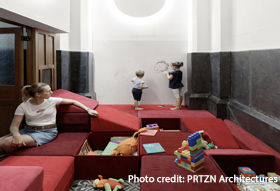
Innovation for small spaces

It's already well known that foam is one of the most popular materials in the design and function of children's playrooms. So much so, that we recently dedicated a whole blog to how foam can form the basis of customised playroom toys, protective wall and furniture covers, and playmats. However, many companies and individuals are now taking the lead from interior design and architecture companies to use foam in ways that can help maximise space - whether in playrooms or not.
A recent interior design project undertaken by PRTZN Arcitecture demonstrates the flexible applications of foam in older, more traditional settings even though foam is a modern engineered component. At a church in Hungary, the firm was commissioned to transform a tiny church room into an appropriate, comfortable space appropriate for both adults and their children.
Estimated to be 12 square metres in size, this narrow space is filled wall-to-wall with modular foam blocks cut to size that act as both an appropriate floor space and as storage units. This room has proven beneficial not only for the storage of toys, but for the storage of additional items by the church. The durability of foam material enabled the architects to design a bespoke solution that fits and accentuates the building's original features, such as angled walls and small, obscure corners.
The use of foam in this setting helped to address several problems commonly encountered in old and poorly insulated spaces, regardless of their use. For example, narrow dimensions can prove difficult to accommodate in terms of soft furnishings and fittings, and cement, tile, or marble floors do not provide sufficient heat and comfort for rooms that are soon to become places to relax. For spaces that are more traditional in style, many furnishings such as modern armchairs and chaise lounges are too bold and eccentric, and naturally encroach on a space. The alternative is sourcing modular foam blocks or foam-covered ottoman style elements to provide both seating and storage in an understated fashion.

Denser, more durable polyurethane foams such as ‘High-Firm’ and ‘Severe’ offer the durable yet customisable opportunities to help transform what we’d consider to be traditional and unorthodox spaces. In the case of the Hungarian church, what appeared to be a firm foam floor was actually constructed using block foam components and storage boxes in both cube and triangle shapes. The level to which foam can be customised brought three key benefits to the children in the playroom – a new elevated floor in which they could play, but also a storage solution and as a toy in itself via its portable elements. Various interchangeable shapes and sizes are ideal for children to stack and roll down, for example.
Various factors influence the choice of foam in different spaces. These include intended purpose, whether the space is indoor or outdoor, and whether the foam is likely to endure constant use. For example, medium to high-density foam is suitable for playrooms as it can withstand weight but is yet still soft and safe to play with.
At eFoam, we pride ourselves on our dedication to provide solutions for all types of environments and tasks, regardless of complexity or job size. We are experts in creating innovative ideas for a range of spaces. Should you wish to consult one of our friendly advisers, please contact us.

